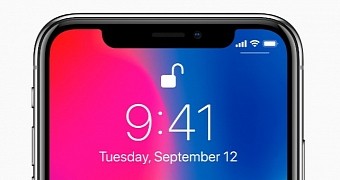After the launch of the iPhone X, it’s now Samsung’s turn to come up with something innovative for its flagship smartphones, and if the latest rumor is true, the company might borrow some of Apple’s ideas for the Galaxy S9.
Twitter user Ice Universe, who has until now provided us with several scoops on Samsung projects, revealed that the firm would install 3D sensor front cameras on the Galaxy S9, as at first glance it plans to follow in Apple’s footsteps.
The iPhone X no longer features a fingerprint sensor, but instead comes with 3D sensing cameras that allow for facial recognition using 3D depth sensing maps stored on the device and analyzed to grant access to the device. Rumor has it that Samsung is going in the same direction for the Galaxy S9, which according to people familiar with the matter should come in the very first months of 2018.
About that feature “copying”
So why the quotes in the title, you could ask. Even though some people might think that Samsung is copying Apple by adopting 3D sensing cameras for the Galaxy S9, this isn’t not entirely accurate, as the South Korean firm has already been part of the facial recognition party for quite some time now.
The Galaxy S8 series, which launched earlier this year in April, come with iris scanning and facial recognition technology, though not as advanced as Apple’s, but which works almost as fast as the iPhone X promises to do. Furthermore, facial recognition systems themselves have been around for a while, including on Microsoft’s now retired Lumia 950 XL which launched in October 2015.
It remains to the be seen if Samsung indeed wants to go down the same path as Apple, but analysts believe the South Koreans aren’t yet willing to give up on fingerprint sensors. The next Note model, for instance, is likely to come with a fingerprint reader embedded into the screen, a feature that Apple failed to develop for the iPhone X, and which eventually forced the company to rely exclusively on facial recognition.
Galaxy S9 will use 3D sensor front camera — Ice universe (@UniverseIce) October 12, 2017

 14 DAY TRIAL //
14 DAY TRIAL //